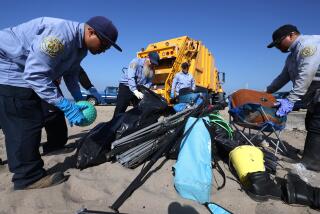Life along concrete river hits bump for Los Angeles homeless as encampments torn down
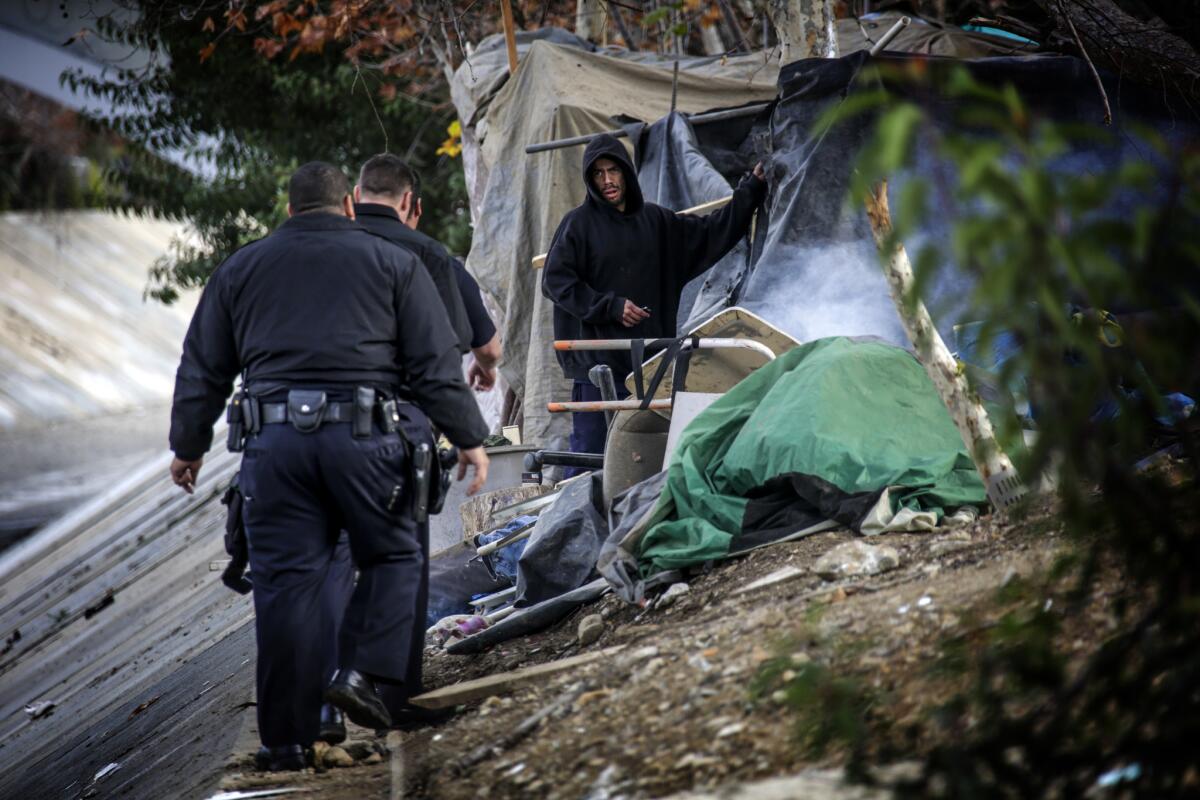
LAPD officers approach a homeless man camped along Arroyo Seco near Avenue 26.
- Share via
The red tape stretched across the road leading to the concrete riverbed.
Juan Mendez ducked under the tape, which warned: “Danger Hazardous Material Do Not Enter.” Then he watched Los Angeles sanitation workers take apart the dwelling on the banks of the Arroyo Seco that for four years he had called home.
Early Wednesday morning, the part-time screen printer with a felony conviction watched workers in hard hats and white hazmat uniforms study a plywood box for any health hazards: human waste, razors, hypodermic needles.
Then the 42-year-old turned and walked away as the workers tossed his belongings down a concrete slab, where a skip loader scooped what had become debris — pillows, bike wheels, stuffed animals, pots and chairs — into sanitation trucks.
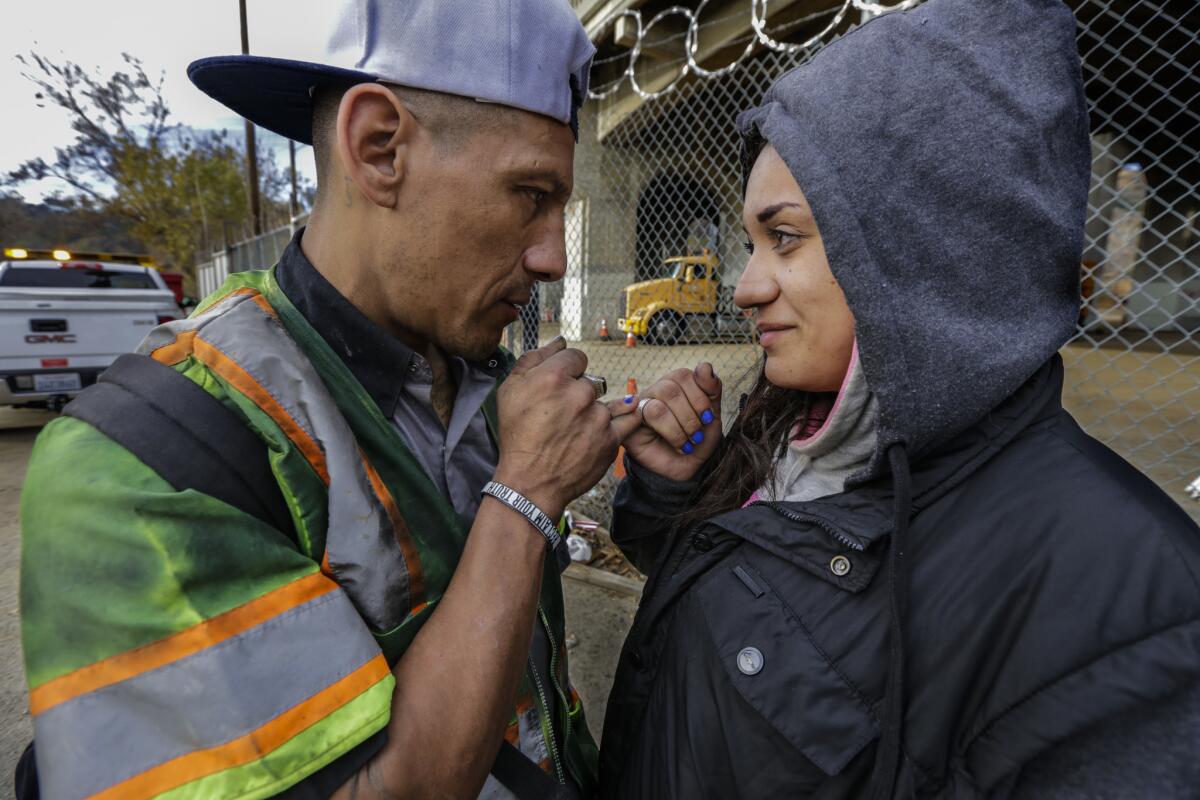
Juan Mendez, 42, and Vanessa Lopez, 24, comfort each other after losing their sleeping place under the Avenue 19 overpass and the 110 Freeway.
Los Angeles is trying to work out a plan for dealing with its vast homeless population. But while strategies are plotted, the job of clearing out homeless encampments goes on.
“We average about 117 [clearings of] encampments per month,” said Steve S. Pedersen, the chief environmental compliance inspector of the Bureau of Sanitation.
In the first two weeks of 2016, 55 camps already have been scraped away.
See the most-read stories this hour >>
In 2015, the Bureau of Sanitation cleared 1,349 encampments. This week’s cleanup, along the Arroyo Seco between Avenue 19 and Avenue 26 in Lincoln Heights, was prompted by a strong series of El Niño-fueled storms and the fear that people and encampments could be swept away during the deluges.
By the time the sweep was complete, the Bureau of Sanitation reported that 18.5 tons of trash were removed, including 150 pounds of urine and feces and 170 pounds of hazardous waste.
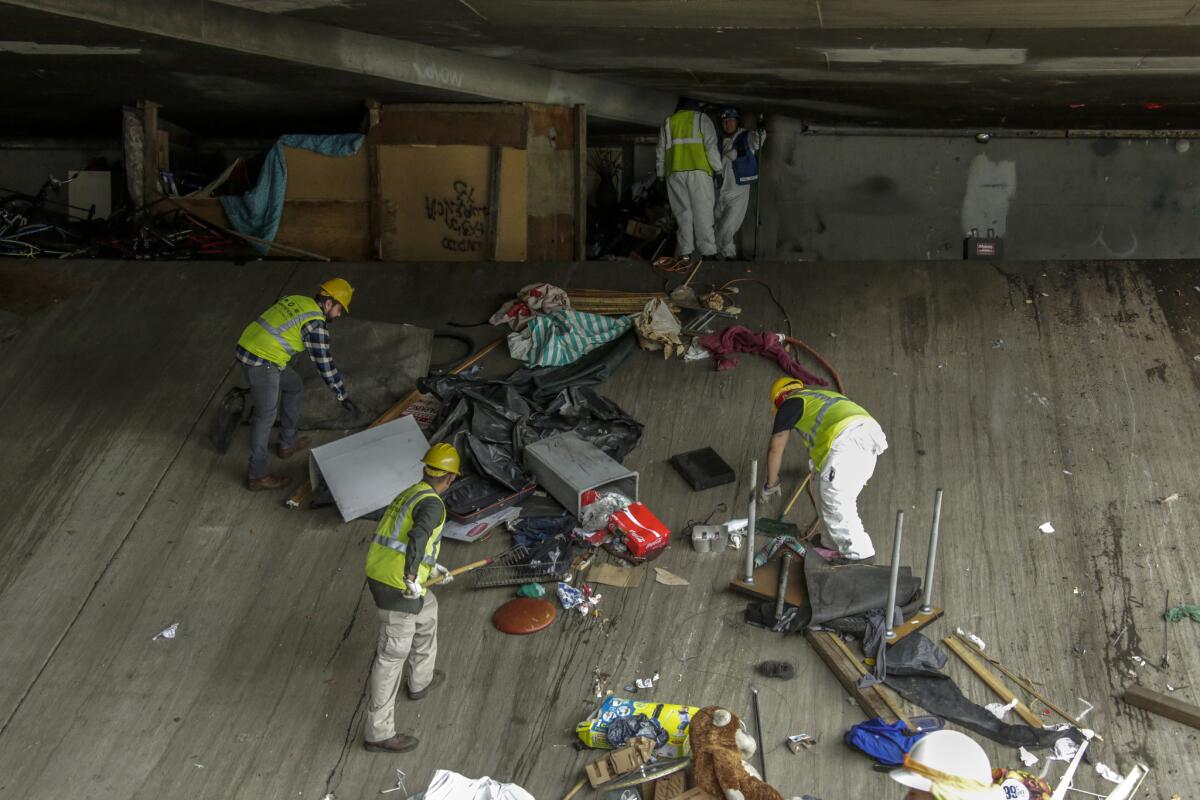
Sanitation department crew members remove a homeless encampment under the Avenue 19 overpass and the 110 Freeway.
The camps that were cleared have been targeted at least three times before, said Elena Stern, spokeswoman for the L.A. City Department of Public Works.
They are on property owned by the city with no public access.
“People have removed the permanent ‘No Trespassing’ signs,” Stern said.
Temporary fliers were taped to columns and fences along the river embankment, reading: “Property of the City of Los Angeles — NO trespassing, parking, dumping and storage of personal property.”
See more of our top stories on Facebook >>
Early Wednesday morning, Monica Alcaraz, a homeless outreach worker, gripped a rope anchored at the top of the sloping embankment. She scaled the wall to the ledge underneath the overpass where people were living.
“I wanted to let you know that the LAPD and everything — they’re coming down, and they’re cleaning everything up,” she told them. “So if you want to start gathering your stuff, that would be really good.”
Alcaraz offered them trash bags and let them know about the nearby Recycled Resources winter shelter, where they could go for food, clothes and maybe shelter, if there was room.
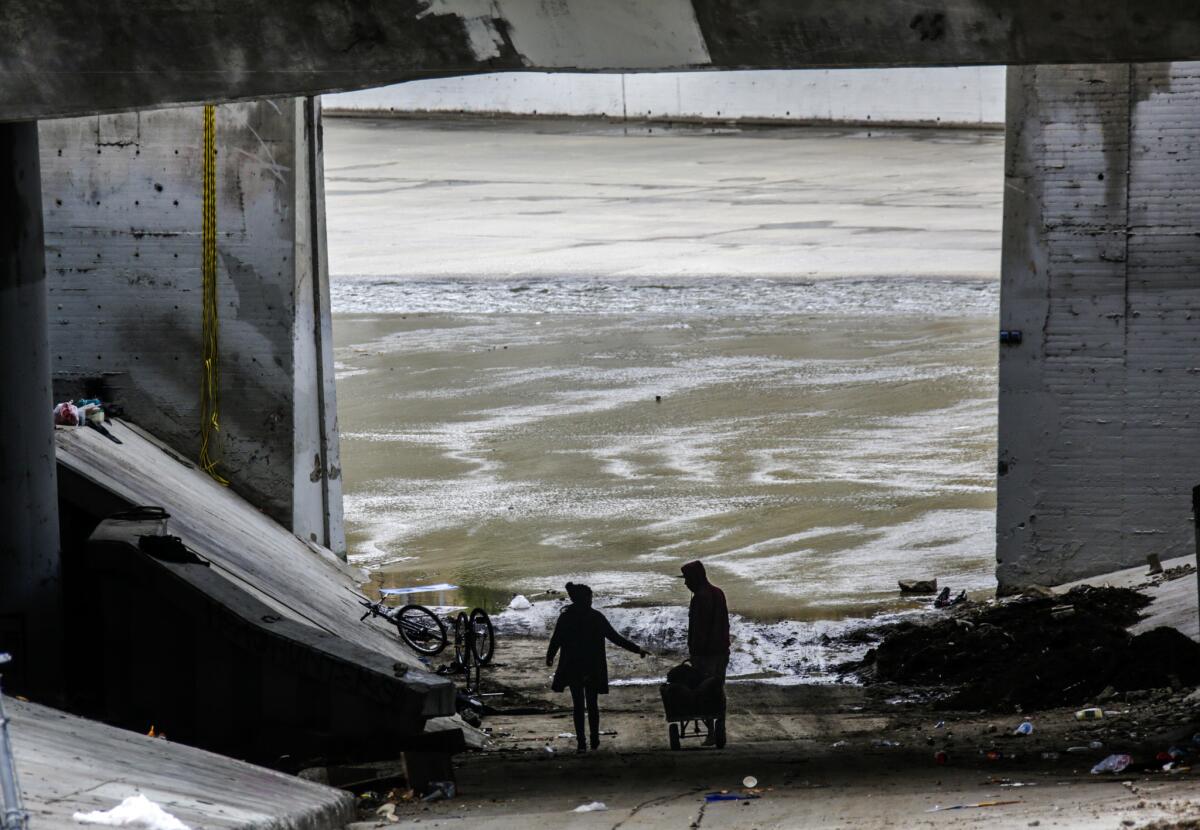
A couple who lived under the Avenue 19 overpass and the 110 Freeway move out from their encampment.
She talked to a 20-year-old former Avenues gang member who had been staying in an encampment there with his girlfriend for the past six months. He declined to give his name because he said his life was in danger.
“I’m waiting for people to forget about me,” he said. “I’m not active anymore.”
He told Alcaraz that his gang activity brought “heat to the house” and that he had to leave in order to protect his family.
Patrolling along the Arroyo Seco toward Avenue 26, LAPD Officer Ulises Taveras told people to be prepared for the cleanup within the hour.
NEWSLETTER: Get the day’s top headlines from Times Editor Davan Maharaj >>
“We understand that homelessness is not a crime, and there’s no way possible that we’ll arrest our way out of this,” Taveras said. “So we’re approaching it differently.”
Taveras, a “Quality of Life” officer whose job includes homeless outreach, has been patrolling the Arroyo Seco area heavily for the past couple of months.
As he walked along the river, he knocked on dwellings. He asked one man how a smoldering chair in the flood channel caught fire.
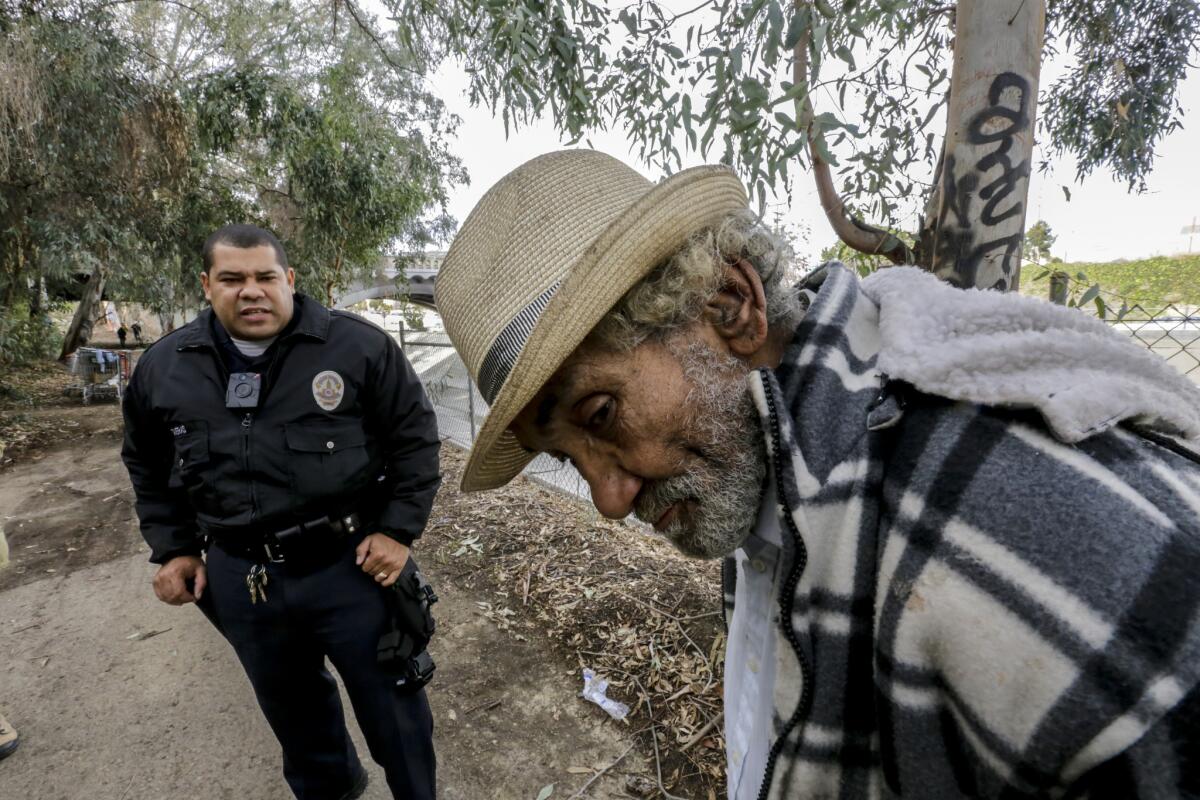
LAPD Officer Ulises Taveras speaks to a man found wandering near a homeless encampment along Arroyo Seco.
He told the man to “try to get as much as you can. If it’s trash, just leave it, all right? We’ll take care of it. We’re going to get rid of it.”
After police secured the area, workers spent the entire day clearing the bulk of the 14 encampments. Caltrans tackled those adjacent to the highways, and city sanitation workers handled camps under bridges and along the riverbed.
Three other agencies — the Los Angeles Homeless Services Authority, the Department of Mental Health and Behavioral Health Services — also descended to pass out information and try to connect people to services.
Ed Leibowitz of the city’s Homeless Services Authority said that they encountered 12 people during the cleanup. Four agreed to enter substance-abuse programs. At least one other person was interested in services but did not commit.
No homeless people from the cleanup surfaced at the Recycled Resources shelter in Highland Park that Wednesday night.
Taveras said he will continue to patrol the Arroyo Seco between Avenue 19 to Avenue 64 two to three times a week — ever mindful of the rains.
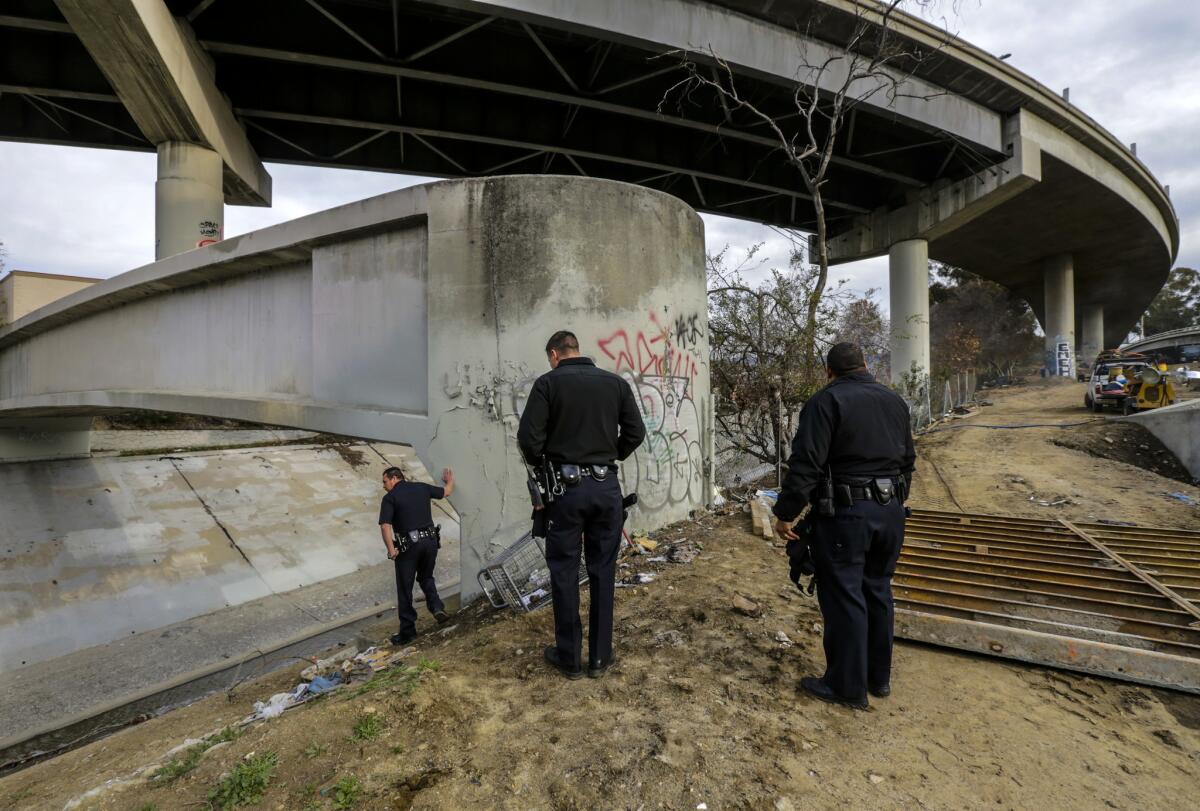
LAPD officers check on homeless encampments along Arroyo Seco.
The morning after the sweep, three dwellings were untouched. Stern, the spokeswoman for the Department of Public Works, said they were spared because they weren’t close enough to the river to be threatened by swelling waters brought on by storms.
William Scott raked the ground in front of the woodshed he built. Music wafted from speakers he jury-rigged to a utility pole.
Another remaining dwelling had a gated stone courtyard built by Porfirio Vasquez, a stonemason with a pet black cat.
Taveras said a 74-year-old man lived in the third structure, though he sometimes moves to an encampment in Boyle Heights, as he has for the past 20 years.
Officials said all three encampments likely will be removed in the future.
Twitter: @lisabiagiotti
ALSO
Another major accident reported on steep Beverly Hills road
Name changes for Ahwahnee Hotel and other Yosemite attractions draw outrage
After fatal shooting on BART train, transit company discloses not all security cameras are real
More to Read
Sign up for Essential California
The most important California stories and recommendations in your inbox every morning.
You may occasionally receive promotional content from the Los Angeles Times.


